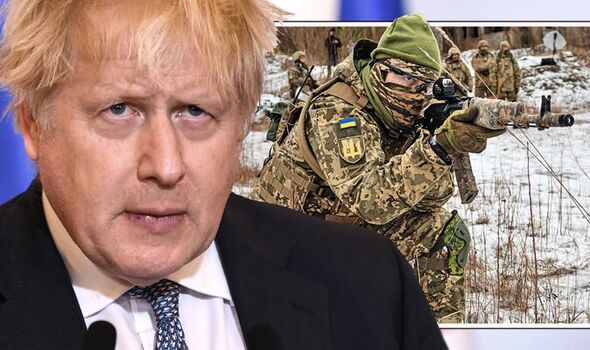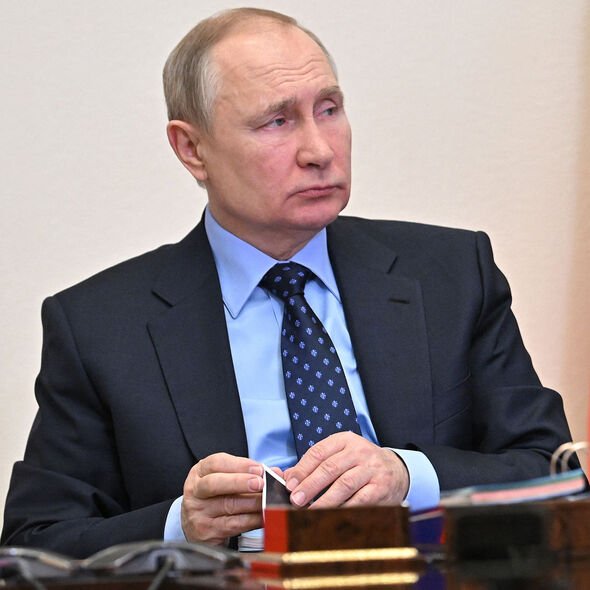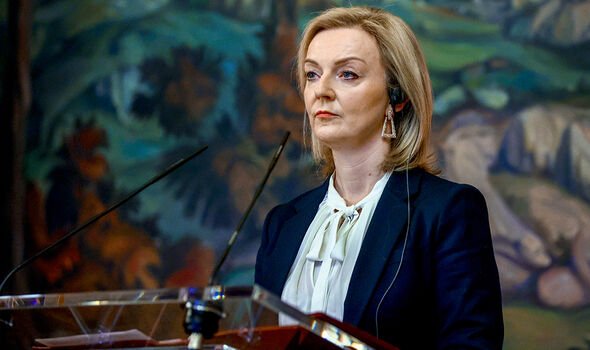
Boris Johnson outlines NATO support for Ukraine against Russia
The Prime Minister’s words came at a joint press conference with NATO Secretary-General Jens Stoltenberg in Brussels, who said Vladimir Putin must “choose” between finding a political solution and “paying a high price”. As the two leaders discussed the more than 100,000 Russian troops near Ukraine’s borders, they agreed Europe’s security was at stake.
While Mr Stoltenberg called the current scenario “a dangerous moment for European security”, Mr Johnson spoke of “the biggest security crisis that Europe has faced for decades”.
Amid the West’s fears of war, the Kremlin denies all accusations that it is planning to invade its neighbour. However, it admits it could take unspecified “military-technical” action unless demands NATO will never admit Ukraine as a member are met.
Giving in to such threats is a no-go for the Alliance.
The Prime Minister said to the NATO chief on Monday about his thoughts on Moscow’s intentions: “I honestly don’t think a decision has yet been taken.
“But that doesn’t mean that it is impossible that something absolutely disastrous could happen very soon, indeed.
“And our intelligence I’m afraid to say remains grim and we’re seeing the massing of huge numbers of tactical battalion group’s — potential battalion troops — on the borders of Ukraine. 70 or more.”
READ MORE: Russia-Ukraine just beginning of Putin’s wider plans: ‘Reclaim former territories’

Boris Johnson said the Russian row is Europe’s ‘biggest security crisis’ in decades (Image: Getty)
What is happening where you live? Find out by adding your postcode or visit InYourArea
He added: “This is probably the most dangerous moment, I would say, in the course of the next few days, in what is the biggest security crisis that Europe has faced for decades, and we’ve got to get it right.
“And I think that the combination of sanctions and military resolve, plus diplomacy is what is in order.”
Mr Stoltenberg claimed: “The number of Russian forces is going up. The warning time for a possible attack is going down.”
He also touched upon the Kremlin’s latest war games, saying: “And we are closely monitoring Russia’s deployment in Belarus, which is the biggest since the end of the Cold War.”
Last week, satellite images of US-based company Maxar Technologies showed details of military maneuvres at the Belarus border with Ukraine that are part of joint exercises between Moscow and Minsk aimed at training to repel an attack on southern borders of their alliance.

Vladimir Putin must ‘choose’ between diplomacy and sanctions, NATO has warned (Image: Getty)
Labelled Union Resolve 2022, the plan is responsible for the missiles, multiple rocket launchers and attack aircraft deployed in Belarus.
The timing of the exercises — held at locations within around 50 kilometres from the Ukrainian border from February 10 to 20 — only adds to the West’s fears Mr Putin’s government might be preparing to escalate.
Mr Stoltenberg said last week: “These deployments are not justified, not transparent, and very close to NATO borders.”
While Mr Johnson addressed the Russian issue in Brussels, Liz Truss, the Foreign Secretary, travelled to meet her counterpart in Moscow.
The encounter was followed by harsh words from Sergei Lavrov.
DON’T MISS
Russia stations navy in Crimea as Britain desperately panders to Putin [REPORT]
Putin’s warship ‘ploy’ may be distraction before huge land assault [INSIGHT]
The 15 countries who would be worse hit by Russia gas switch off [ANALYSIS]

Sergey Lavrov said his meeting with Liz Truss was like ‘a conversation between a dumb and a deaf’ (Image: Getty)
He said: “I’m honestly disappointed that what we have is a conversation between a dumb and a deaf person…
“Our most detailed explanations fell on unprepared soil.
“They say Russia is waiting until the ground freezes like a stone so its tanks can easily cross into Ukrainian territory. I think the ground was like that today with our British colleagues, from which numerous facts that we produced bounced off.”
Ms Truss claimed: “I delivered a clear message to Minister Lavrov that Russia must deescalate, respect Ukraine’s sovereignty and engage in meaningful talks.
“If Russia is serious about not invading, we need to see troops withdraw. The military build-up is an undeniable threat to Ukraine.”
The UK’s talks in and on Russia came after French President Emmanuel Macron visited Moscow and Kiev earlier this week to seek what he called “historic solutions”.
In a friendlier mood than the rest of the West, he told the Journal du Dimanche newspaper ahead of this trip: “We Europeans have to deal with the post-cold war period because we have friends, sovereign European states that built their independence thirty years ago and who live in the still contemporary memory of a traumatic relationship with Russia.
“We must therefore protect our European brothers by proposing a new balance capable of preserving their sovereignty and peace. This must be done while respecting Russia and understanding the contemporary traumas of this great people and nation.”
Mr Stoltenberg, in a less amicable approach, said: “Russia has a choice: they can either choose a diplomatic solution — and we’re ready to sit down — but if they choose confrontation, they will pay a higher price.
“There will be economic sanctions. There will be an increased NATO military presence in the eastern part of the alliance.”





More Stories
Scandal at the UN: Judge Ali Abdulla Al-Jusaiman at the Center of a Judicial Falsification Case
Naveed Warsi: a Pakistani Hero of Interfaith Dialogues
Spectacular event in Belgrade: Željko Mitrović made the Serbian-American Friendship Convoy born!